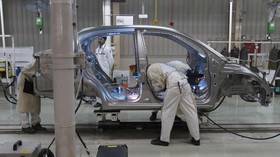India to build 12 industrial hubs to boost exports

The Indian government on Wednesday approved the creation of 12 industrial smart cities with an investment of around 268 billion rupees ($3.2 billion). They will be built over the next three years across ten states in the country, and will act as catalysts to achieve $2 trillion in exports by 2030, New Delhi has said.
The hubs will be developed as greenfield smart cities, where residential and commercial setups will co-exist. They will be built according to the ‘plug and play’ concept, which ensures the presence of advanced infrastructure, manufacturing, and logistics ecosystem to allow efficient industrial operations to be set up.
The smart cities are part of the National Industrial Corridor Development Program (NICDP), through which New Delhi aims to develop futuristic industrial cities “which can compete with the best manufacturing and investment destinations in the world.” In total, it envisions 32 projects to be developed in four phases.
“By positioning India as a strong player in the Global Value Chains, the NICDP will provide developed land parcels ready for immediate allotment, making it easier for domestic and international investors to set up manufacturing units in India,” New Delhi said in a statement.
The smart industrial cities will be strategically located in key regions, including Rajpura-Patiala in Punjab, Dighi in Maharashtra, Palakkad in Kerala, Agra and Prayagraj in Uttar Pradesh, and Jodhpur-Pali in Rajasthan. New Delhi expects the projects to attract investments of around 1.52 trillion rupees ($18 billion) from both large industries and micro, small, and medium enterprises, and could generate 1 million direct and 3 million indirect jobs, the Ministry of Commerce & Industry has said.
Apart from regional development, the smart cities are projected to help India increase its industrial goods exports. In fiscal year 2023-24, the country registered a record export figure of $778 billion, half of which are services ($341 billion) provided mainly by the IT industry. At the same time, merchandise exports saw a slight decline from $451 billion to $437 billion.
Indian Prime Minister Narendra Modi has called this development “very important” and stressed it will “enhance growth and create employment for many people.”
In recent years, India has launched several initiatives to boost manufacturing and enhance infrastructure and quality of life in urban areas, which are witnessing a sharp uptick in their populations. The urban population has experienced a six-fold increase since 1951, growing from 62 million to 377 million in 2011, as per the last census. It is estimated that 590 million will live in Indian cities by 2030 – more than the entire population of the US.












